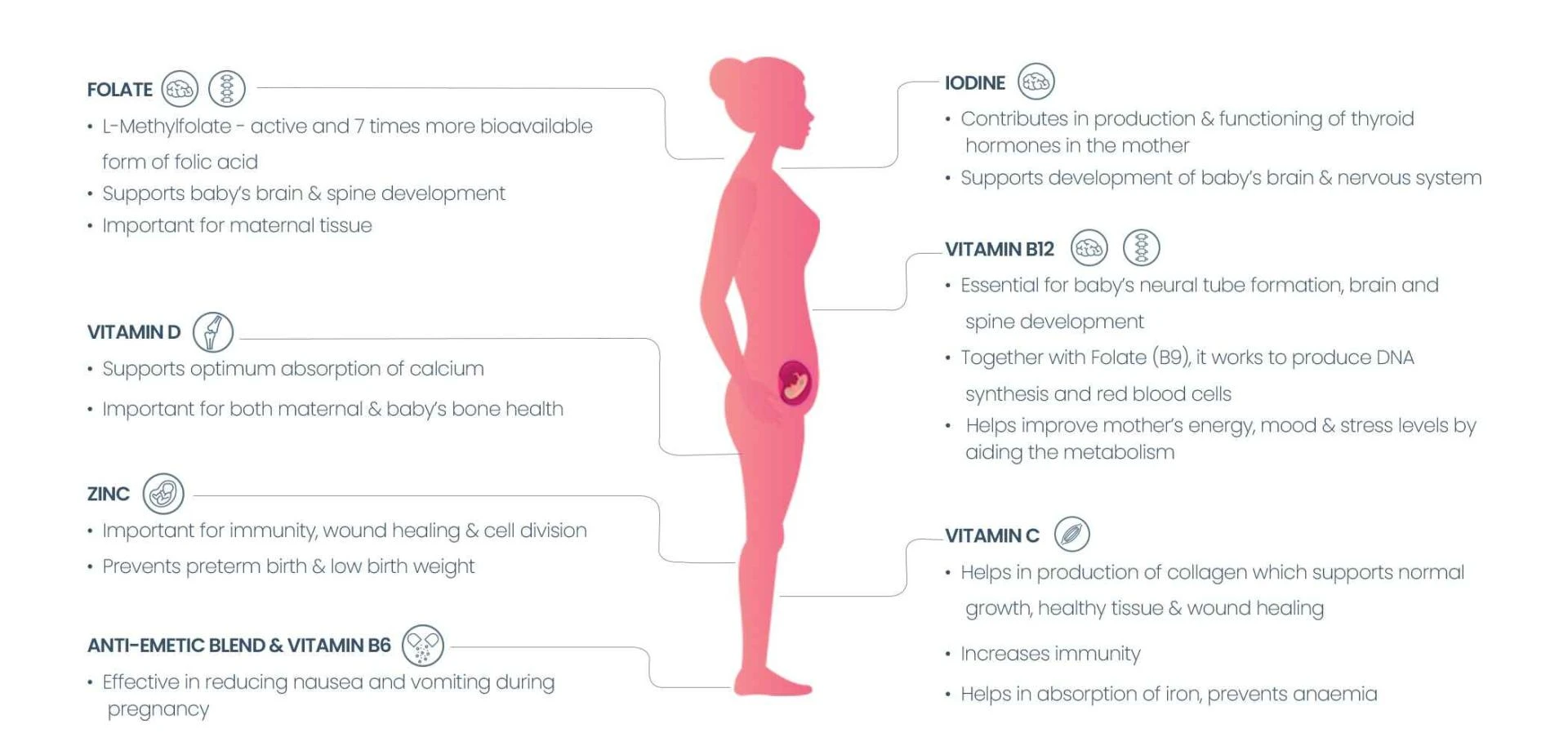Pregnant mothers need to consume the right nutrients in the right quantities, including calcium, iron, vitamins, and protein, to ensure their health and that of their baby, as optimal intake is crucial for a healthy pregnancy. Among the crucial dietary components needed during this period, protein in pregnancy stands out as a powerhouse nutrient that plays an indispensable role in the health and development of both the mother and the growing baby. Protein for pregnant women is crucial for the baby's development, especially during the second and third trimesters, providing amino acids for bone, cell, and muscle development. Proper intake of protein during pregnancy can reduce neonatal complications and facilitate weight gain. However, low-protein diets can lead to lower birth weight and potentially chronic health problems later in life. Ensuring an adequate intake of protein-rich foods or pregnancy vitamin supplement under the guidance of a doctor contributes significantly to a healthy pregnancy and sets the stage for the well-being of both mother and child. Proteins present in Trimacare prenatal vitamins are essential for foetal development, promoting cellular growth, tissue formation, and organ development.
ROLE OF PROTEIN DURING PREGNANCY
Protein is crucial during pregnancy, as it helps in the growth of the baby's tissues and organs, including skin, hair, fingernails, muscles, and the foetus's brain due to its essential supply.
Building Blocks for Growth:
Protein serves as the fundamental building block for the body's cells, tissues, and organs. During pregnancy, the demand for protein for pregnant women increases significantly to support the rapid growth and development of the foetus. Protein helps in forming the baby's muscles, bones, organs, and other essential structures.
Supporting Maternal Health:
Protein is not only vital for the baby but also for the mother. Protein during pregnancy helps in maintaining and repairing tissues, supporting the expansion of the uterus, and developing the placenta. Additionally, adequate protein for pregnant women intake contributes to a healthier immune system and overall maternal well-being.
Balancing Blood Sugar Levels:
Consuming protein-rich foods alongside carbohydrates can help stabilize blood sugar levels, preventing sudden spikes and crashes. This balance is beneficial in managing gestational diabetes, a condition that can arise during pregnancy.
Preventing Preeclampsia:
Studies suggest that a diet rich in protein during pregnancy might lower the risk of developing preeclampsia, a potentially serious pregnancy complication characterized by high blood pressure and organ damage.
Ensuring Optimal Birth Weight:
Adequate maternal protein for pregnant women intake is linked to healthy foetal growth and can contribute to ensuring the baby is born at a healthy weight. This factor is essential for the baby's immediate and long-term health.
Managing Morning Sickness:
Protein-rich snacks can often help alleviate symptoms of morning sickness. Foods like nuts, yogurt, and lean meats can provide a source of steady energy and ease nausea.
Meeting Increased Demands:
The recommended daily intake of protein during pregnancy is higher than usual to accommodate the needs of the growing baby and the changes happening in the mother's body.
Symptoms of Protein Deficiency During Pregnancy
Inadequate protein intake during pregnancy can lead to symptoms such as fatigue, weakness, muscle loss, and impaired immune function. Severe protein deficiency may increase the risk of complications such as preeclampsia and intrauterine growth restriction.
Risks of Excessive Protein Intake
Consuming excessive amounts of protein during pregnancy may strain the kidneys and increase the risk of dehydration. It can also lead to imbalances in other nutrients and potentially harmful metabolic changes.
Balancing Protein Intake with Other Nutrients
Pregnant women should strive for a balanced diet that includes a variety of nutrient-rich foods, including carbohydrates, fats, vitamins, and minerals, in addition to protein. This helps ensure optimal nutrition for both the mother and the baby.
Meal Planning Tips for Pregnant Women
Planning meals that include a combination of protein, carbohydrates, and healthy fats can help pregnant women meet their nutritional needs. Incorporating a variety of foods from different food groups ensures a well-rounded diet.
Special Considerations for Vegetarian and Vegan Pregnant Women
Vegetarian and vegan pregnant women should pay special attention to their protein intake and ensure they consume a diverse range of plant-based protein sources to meet their nutritional requirements. Consulting with a healthcare professional or a registered dietitian can help create a balanced meal plan.
Consulting with Healthcare Professionals
It's essential for pregnant women to consult with their healthcare providers to determine their individual nutritional needs and address any concerns or questions about protein intake during pregnancy. Healthcare professionals can offer personalized guidance based on medical history, dietary preferences, and lifestyle factors.
TRIMACARE PRENATAL MULTIVITAMINS IS THE BEST PROTEIN SUPPLEMENTS:
Pregnant women need 70-100g of protein daily, depending on weight and activity, to support foetal growth. This requirement of protein for pregnant women increases each trimester. Indian meals may not provide sufficient protein, in this case a pregnancy vitamin supplement of protein can help in meeting daily requirements of protein during pregnancy.
Trimacare pregnancy vitamin tablet, based on ICMR and WHO Multi-Micronutrient Model, provides trimester-specific care for Indian mothers and their unborn children at every stage of pregnancy, containing over 20 essential nutrients.
Trimacare multivitamin tablet for pregnancy contain protein, providing essential amino acids for optimal baby growth and health, as proteins are crucial building blocks in foetal development.
Source url - https://blognow.co.in/the-essential-role-of-protein-during-pregnancy-nurturing-the-mom-and-the-baby

